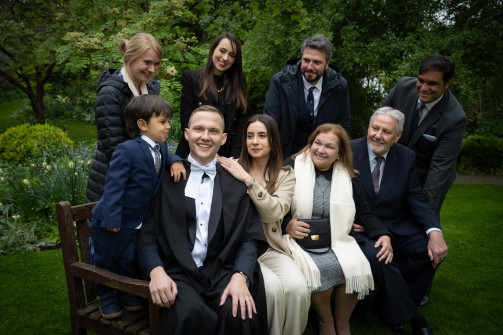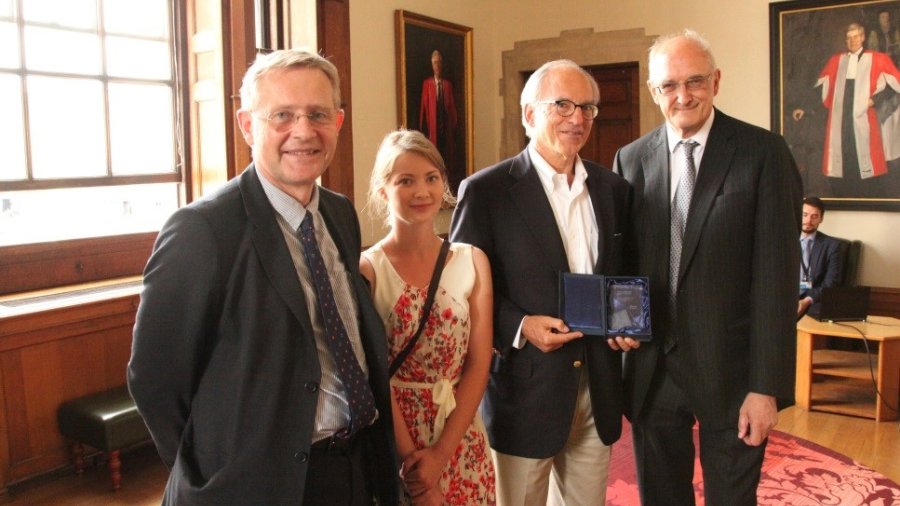Celebrations at April graduation


Wolfson alumnus and Fellow Dr Peter Neyroud has won the 2023 Robert Boruch Award for Distinctive Contributions to Research that Informs Public Policy

Left to right: Dr Peter Neyroud with his daughter Dr Eleanor Neyroud, alongside Professor Lawrence Sherman and Sir Leszek Borysiewicz, Emeritus Vice-Chancellor of the University and Honorary Fellow of Wolfson at the Vice Chancellors' Awards for Impact (2017).
Wolfson Fellow Dr Peter Neyroud – Associate Professor in Evidenced-based policing at the Institute of Criminology – has become the 2023 Robert Boruch award winner. The Robert Boruch Award is made annually by the Campbell Collaboration for distinctive contributions to research that informs global public policy.
“It’s wonderful to see Peter winning this prestigious award for research that makes a real impact. After all, that’s what Wolfson is all about!” said Wolfson President, Professor Jane Clarke.
The award recognised Dr Neyroud's work for the Campbell Collaboration on the evidence for preventing terrorism and radicalization. As Co-chair of Campbell’s Crime and justice coordinating group, he has been working with the 5RD – the research leaders from the Five Eyes (US, Canada, Australia, New Zealand and UK) – on the largest ever global programme to review the evidence in this field.
“It is really special getting an award for work you really value and special to get an award like this for your second career" said Dr Neyroud.
“I have received awards - a QPM and CBE amongst others - for my policing career and I very much value them, but it is a delight to be recognised for a continuing contribution in a different discipline,” he added.
After gaining a Modern History degree from Oriel College, Oxford in 1980, Peter joined Hampshire Police and was a police officer for more than 30 years, serving in Hampshire, West Mercia and Thames Valley, where he was the Chief Constable (2002-2007). He set up and ran the National Policing Improvement Agency (as Chief Constable and Chief Executive). In the latter role, he was responsible for national implementation of all the major programmes in UK policing, including Neighbourhood Policing, Workforce reform and new technology.
In 2010, he was commissioned by the UK Home Secretary to carry out a fundamental “Review of Police Leadership and Training” which led to the establishment of the new National “College of Policing” in 2012 and radical reform of the qualifications and training of police officers, creating the new “Police Education Qualification Framework”.
Dr Neyroud has a long association with Wolfson, first coming for a Diploma in Applied Criminology whilst he was a Detective Superintendent as part of his Strategic Command Course. He returned in 2011 to do a part time PhD in Criminology which he completed in 2017.
His research focused on randomized controlled trials (RCTs) in policing, and he led a major trial in Birmingham, Operation Turning Point, which tested the effectiveness of police-led diversion of offenders against the traditional prosecution route.
“Operation Turning Point has been a ground-breaking study" says Dr Neyroud, "it was the first randomised controlled trial to randomise the prosecution decision.”
“Through this research, we were able to show that diversion is more effective at reducing harm and more valued by victims, when it is done well and communicated well.”
Case study examples from Operation Turning Point detailed several benefits of non-prosecution routes, which included signposted support for offenders including alcohol treatment programmes, drug advice services, health support and employment meetings. This was contrasted with the section of the sample that went to prosecution, who variously went to court and paid fines, but had no opportunities for rehabilitation.
“We have supported two replications - one in Durham and one in the Metropolitan police - which have supported the initial findings.
“In both Birmingham and London it was also good to have my oldest daughter - Eleanor (another Wolfson PhD in Criminology) - working as the field researcher and data analyst.”
Dr Neyroud was appointed as Lecturer in Criminology in 2016, and became the Director of the Masters programme in Applied Criminology and Police Management in 2022.







